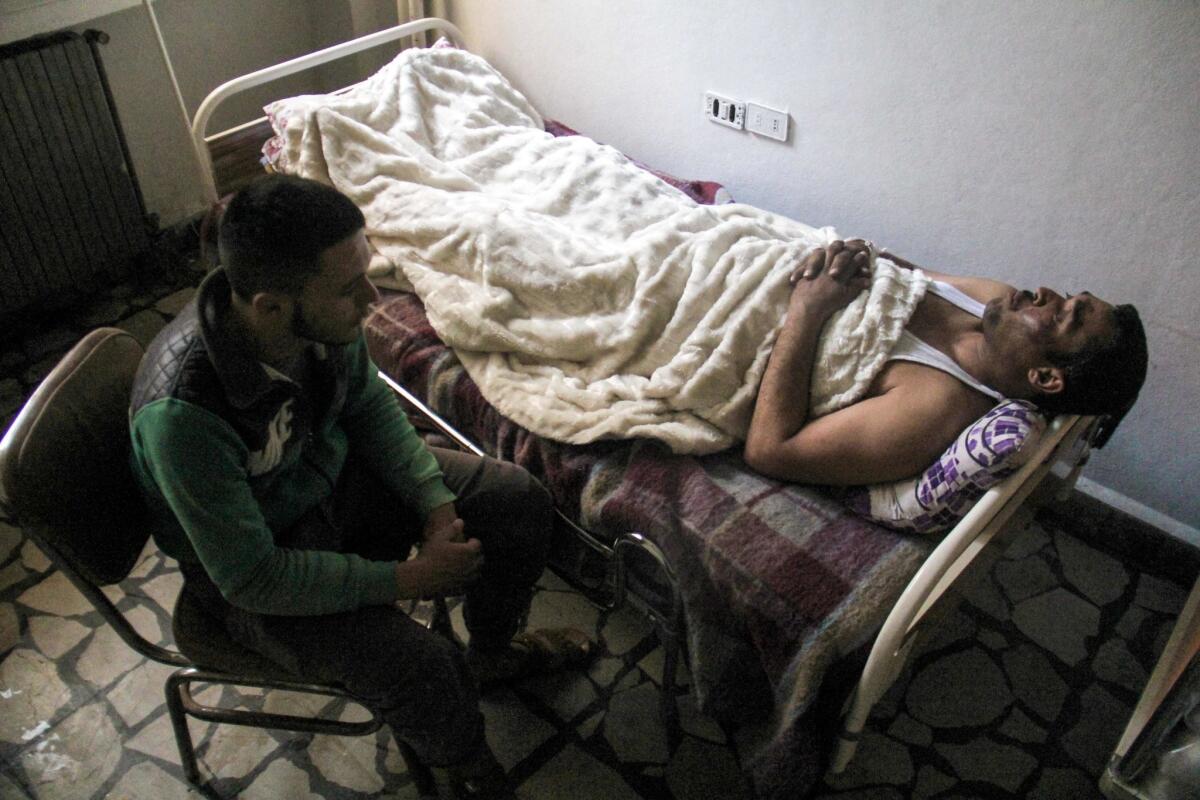Syria’s government was supposed to have gotten rid of its chemical weapons in 2014. So what happened?

- Share via
There’s a mystery at the heart of an apparent chemical weapons attack in Syria this week: Syria’s government, suspected of carrying out the attack, was supposed to have gotten rid of all its chemical weapons in 2014.
A year earlier, President Obama said Syria had crossed a “red line” by allegedly using sarin gas near Damascus and Aleppo, killing at least 100 to 150 people. But rather than take military action, Obama agreed to a Russian deal to dismantle Syria’s chemical weapons program.
Syria’s foreign minister has denied that the country’s forces use chemical weapons in its battle with opposition rebels and Islamic State militants, both of whom seek the overthrow of President Bashar Assad. But the effectiveness of the Obama deal is now under new examination.
How are chemical weapons regulated?
The wartime use of chemical weapons was banned by the Geneva Protocol in 1925 after more than 90,000 soldiers were killed during World War I by materials including chlorine and mustard gas.
But nations including the United States and the former Soviet Union amassed stockpiles of chemical weapons throughout the 20th century. They largely went unused, with a major exception during the Iran-Iraq war in the 1980s. That’s around when U.S. officials first reported that Syria had produced its own substantial chemical weapons stockpile.
The signing of the international Chemical Weapons Convention in 1993 began a phase of worldwide disarmament as almost every nation joined the pact. Syria was one of the few nations that didn’t, which raised concerns after the country tipped into civil war in 2011 and chemical weapons were repeatedly used in the conflict.
Investigators have accused both the Syrian government and Islamic State of using chemicals in the fight.
The Syrian deal
The deal between the U.S. (an Assad opponent) and Russia (an ally) was struck in September 2013. Under the agreement, Syria gave a manifest of its chemical weapons and facilities to the Organization for the Prohibition of Chemical Weapons, the global chemicals watchdog, which moved quickly to decommission the declared facilities and weapons.
By the end of 2014, all of Syria’s declared chemical weapons were destroyed, along with 24 of Syria’s 27 declared production facilities. (The other three have not yet been destroyed yet due to instability, according to inspector reports.)
Yet some officials were skeptical. In February 2016, James R. Clapper, Obama’s Director of National Intelligence, testified to the U.S. Senate Armed Services Committee that Syria had not declared its entire chemical weapons program to inspectors. International monitors continued to receive reports of smaller chemical attacks throughout 2016.
On Jan. 12, in the closing days of the Obama administration, the U.S. Treasury department unveiled sanctions against Syrian military, security and research officials accused of being connected to Syria’s chemical weapons program or with chemical attacks in recent years.
The recent attack
Tuesday’s attack in the northern Syrian town of Khan Sheikhoun left at least 70 people dead and hundreds more affected, with many of them struggling to breathe, according to the World Health Organization, citing medical groups working in Syria. U.S. officials reported seeing fixed-wing Syrian aircraft dropping bombs over the town around the time of the suspected gassing.
U.N. officials called it the largest chemical weapons attack in Syria since 2013. With many hospitals damaged due to fighting, local emergency rooms were overwhelmed and some patients were taken to hospitals in southern Turkey, the WHO reported.
Doctors Without Borders, the international aid organization, said it’s possible at least two different chemicals were used in the attack — sarin gas and chlorine. The Organization for the Prohibition of Chemical Weapons said its investigators have begun gathering information.
Markus Binder, a chemical weapons expert at the University of Maryland, said he still had basic questions about the attack that need to be confirmed, including exactly what chemicals were used and whether the Syrian government carried out the attack.
Nor did the use of chemicals make immediate sense, given that the government has been using explosives that often kill civilians.
“Why now?” Binder said. “It puzzles.”
ALSO
Syria’s Assad was in a strong position a week ago. A suspected chemical attack changed everything
Here’s some of what we know about the apparent chemical weapons attack in Syria
Is Islamic State luring U.S. coalition forces into killing civilians in airstrikes?
More to Read
Sign up for Essential California
The most important California stories and recommendations in your inbox every morning.
You may occasionally receive promotional content from the Los Angeles Times.











